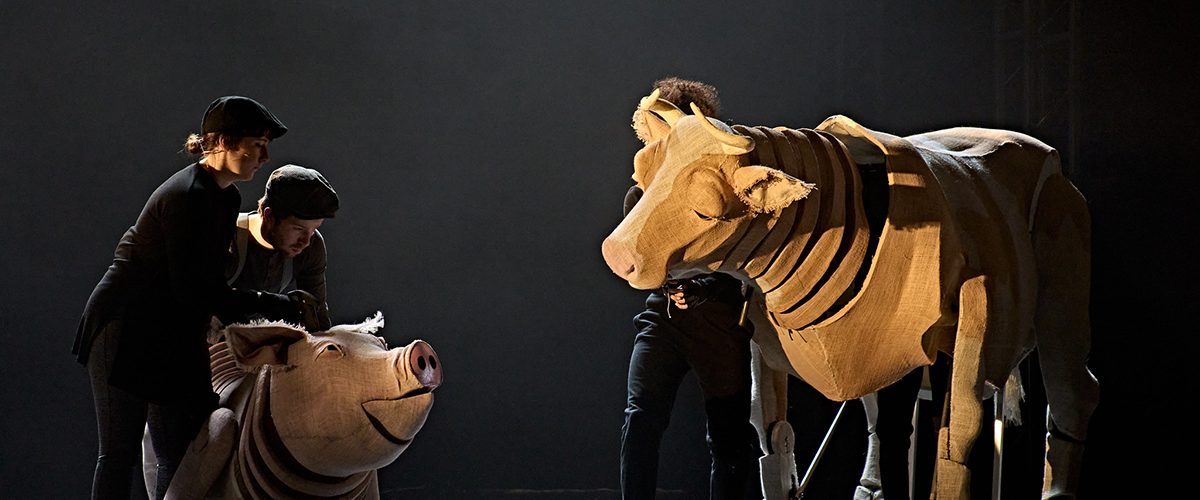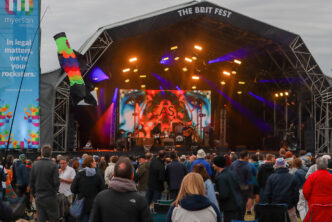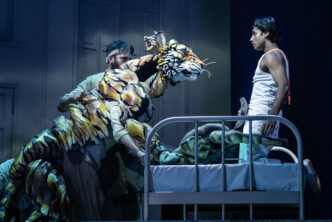Old Etonian, Eric Blair – better known to us as George Orwell – walked-the-walk rather more determinedly than most bourgeois left-leaning artists and intellectuals. His early works of social criticism (Down and Out in Paris and London and The Road to Wigan Pier) stemmed from immersive experiences alongside the poor and powerless. Orwell also fought (and very nearly died) for the republican cause in the Spanish Civil War. However, it was the vicious infighting of the leftist factions that was to leave its major imprint on Orwell’s later and more famous works (Animal Farm and Nineteen Eighty-Four); the earlier work in particular is most commonly interpreted as a critique of Stalin’s ruthless betrayal of the Soviet revolution.
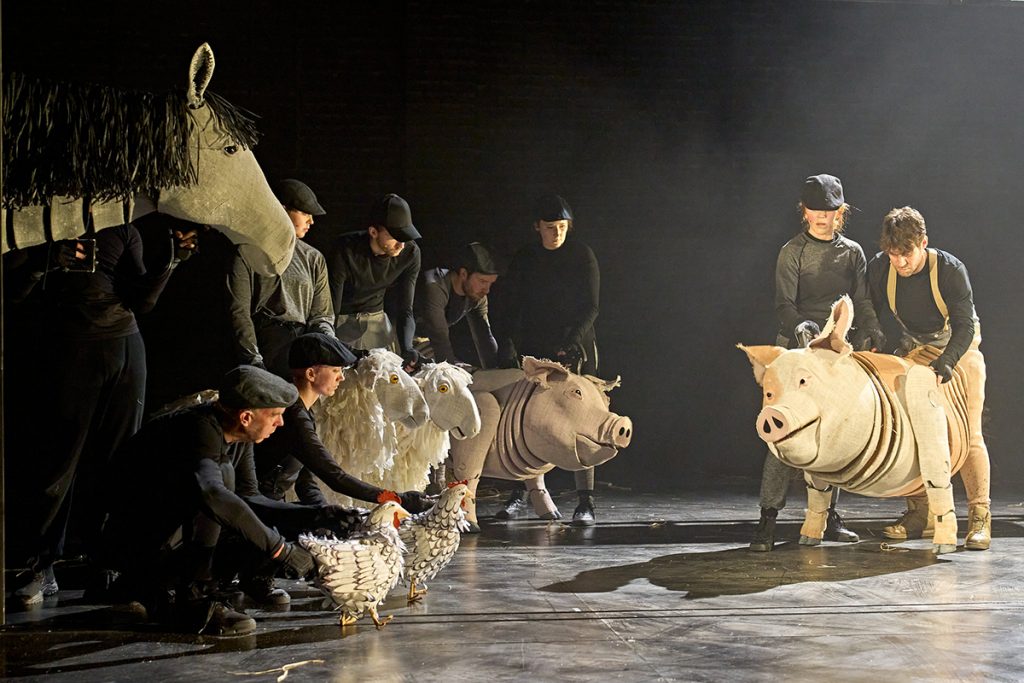
Having directed a memorable adaptation of Nineteen Eighty-Four, (co-created with Duncan MacMillan in 2019) Robert Icke addresses his considerable talent to this adaptation of Animal Farm. In this production, he collaborates with Toby Olié (co-creator of the puppets for the iconic stage version of Michael Morpurgo’s War Horse). The ‘cast’ are a vivid and various collection of puppets, skilfully manipulated by 14 puppeteers. The voices of the animals have been pre-recorded by a cast including Robert Glenister and Juliet Stephenson.
As the audience files in, the farmer, in his bloodstained apron, is making his weary way, stage left to right, lugging a succession of sizeable joints of meat. It’s hard work. He pauses to kneel and catch his breath at one point, and is that medicine or alcohol he is swigging from the bottle?
The animals of the farm gather to hear the venerable pig, Major tell them he has had a dream; a dream in which all animals are equal and free at last from the heartless exploitation of mankind. Soon after this inspiring address, Major is gone – his throat slit (as the farmer himself smugly reports in a mobile phone conversation) rather than stump up for vet’s bills for the sickly, old animal. Snowball, a younger pig, tells them the time for revolution (as dreamed of by Major) has come.
Working together (organised by Snowball) the animals drive out the farmer and even repel a concerted attempt (by him and his neighbours) to wrest back control of the farm. Freedom comes at a cost, though. Supertitles list the animals who ‘fell in combat’. The action also makes an ‘Animal Hero: First Class’ of two participants – Snowball himself, and the massive cart horse, Boxer. In what follows, the betrayal of the revolution plays out via the fate of these two exceptional beasts.
In a power struggle, another pig, the corrupt megalomaniac, Napoleon, drives out Snowball, and rewrites recent history, branding the hero a traitor, and condemning to death any animal said to have ‘conspired’ with him. Alongside this, the hens, rebelling against increased quotas for eggs, are ostracised and starved to death. Soon it appears that more animals have been starved and executed than fell in combat. Henceforth, the absent Snowball, will be blamed for every catastrophe that befalls the farm.
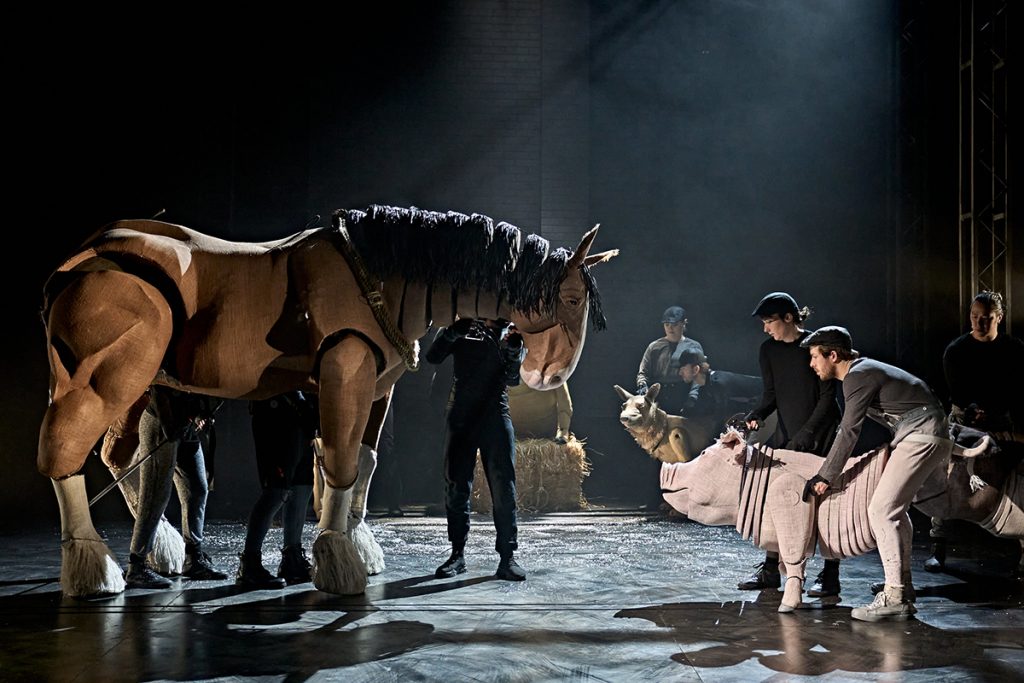
The noble Boxer, who refuses to glory even in the killing of a human, becomes the Stakhanovite of the newly renamed Animal Farm, whose determined response to every reversal is to work harder. It’s an impressive theatrical moment when this enormous puppet (requiring three operators) finally succumbs to exhaustion.
One by one, the eight key ‘commandments’ of the revolution are amended or deleted, until only the chillingly ironic, “All animals are equal, but some are more equal than others” remains. Napoleon and his apologist, Squealer, now don clothes and the other beasts find it hard to tell which is the pig, which the human, as money and savage exploitation are re-established in the new regime.
There is a tremendously poignant episode when, following the purges, the animals try to rally their spirits with a rousing chorus of the revolutionary song (it’s a fine, uplifting piece, by the way). Napoleon’s stooge, Squealer interrupts to say the song is now banned; deemed irrelevant, as the revolution is complete. A heartbreaking interlude, which captures all that is best and worst about these creatures.
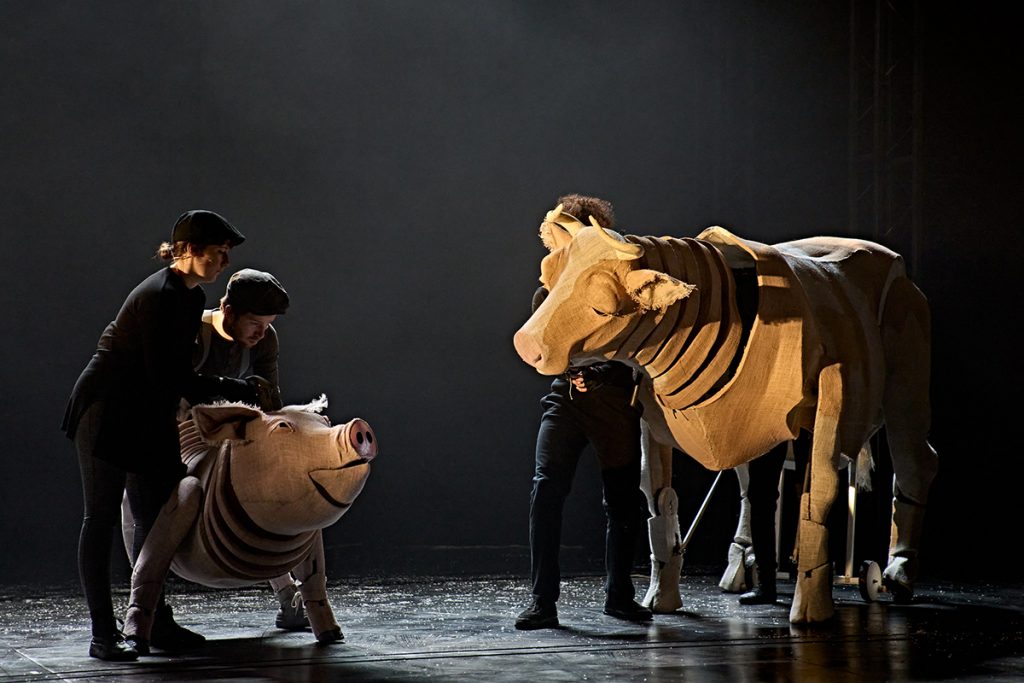
At the close, Clover (in this production a cow not a horse) tells her frolicking calf that she recalls there having a been a revolution, but can’t remember its purpose. We know what fate lies in store for the calf.
Bunny Christie’s set design is stark and effective – charcoal grey board speaking of a working farm and barn. Jon Clark’s lighting is unfussy and appropriately utilitarian, but never sacrifices clarity for mood.
The predominantly teenage audience gives a respectful ovation (and is attentive throughout – tantamount to a triumph, I’d say).
A thoughtful, unsentimental and bold piece of work from Icke and the company. Thoroughly recommended – all the more so in these troubled, deceitful times.
Animal Farm was at the Lowry from 24-26 March 2022 and touring until the end of May.

